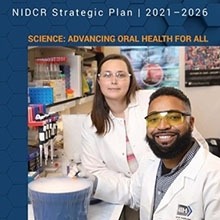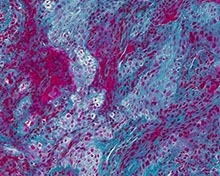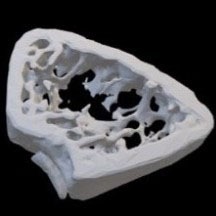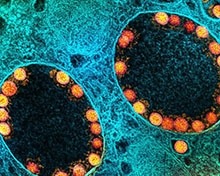Spring 2022
NIDCR News

In December, NIDCR announced the release of a report that provides a comprehensive snapshot of oral health in America, detailing 20 years of advances and challenges and drawing on data from public research and evidence-based practices. For more on the report, including a video message from the NIDCR director, monthly report snapshots, and more, visit NIDCR’s Oral Health in America webpage.

Drawing on findings and recommendations from Oral Health in America: Advances and Challenges, NIDCR Director Rena D’Souza, DDS, PhD, Science Advisor to the President and former NIH Director Francis S. Collins, MD, PhD, and US Surgeon General Vivek H. Murthy, MD, MBA, write in a recent New England Journal of Medicine Perspective that addressing oral health disparities will require changes that include a better understanding of the intersection of oral, overall, and mental health, as well as efforts to make oral health care accessible and affordable for all Americans.

From March 21 to 26, NIDCR leadership, program staff, investigators, and trainees will be attending the 2022 AADOCR/CADR Annual Meeting, a hybrid event held virtually and in person in Atlanta, Georgia. Attendees are welcome to make an appointment to meet one-on-one with NIDCR program officers and other staff. To learn more about NIDCR-sponsored symposia and other events, access the schedule on NIDCR’s website or follow @NIDCR on Twitter.

NIDCR has released a new strategic plan outlining its research and training priorities for the next five years. The plan aims to advance fundamental knowledge about dental, oral, and craniofacial health and disease, and to translate these findings into prevention, early detection, and treatment strategies that improve overall health for all individuals and communities across the lifespan.

On January 3, Lynn Mertens King, PhD, was named director of NIDCR’s Division of Extramural Activities (DEA). Prior to her new role, King held several other positions within DEA since 2001, including chief of the Research Training and Career Development Branch, chief of the Scientific Review Branch, and scientific review officer.

Dr. Rena D’Souza reflected on her career and inaugural year as NIDCR director in a recent interview published by NIH’s chapter of the Federal Asian Pacific American Council. She highlighted the importance of being proactive and setting goals in one’s career. As a leader, Dr. D’Souza works to unite people towards a shared vision through transparent communication and valuing individuals.
Science Advances

In a study published in Science, a team led by NIDCR’s Niki Moutsopoulos, DDS, PhD, and Thomas Bugge, PhD, found that buildup of a blood-clotting protein, called fibrin, triggers an overactive immune response that damages the gums and underlying bone. By blocking fibrin's function, the researchers prevented bone loss in mice with gum disease.

Recent studies led by NIDCR immunologist Wanjun Chen, MD, and neurologist Mark Hoon, PhD, indicate that not all itch is created equal. The researchers identified key immune molecules that drive wound-induced itching and chronic itch. The findings show that distinct combinations of molecules appear to underlie different types of itch, and tailored treatments may be better than a one-size-fits-all approach.

NIDCR researcher Ashok Kulkarni, PhD, and colleagues found that a tooth-hardening protein can help promote bone formation and prevent bone loss in mice through its role in bone turnover, where worn-out bone is continuously replaced by healthy new tissue to keep bones strong. The study may inform new interventions for conditions marked by bone loss, such as severe gum diseases and osteoporosis.
Grantee News
Study Reveals How Migraine Pain Signals Are Generated—and Blocked
A Crowning Achievement in Understanding Head Development
Researchers Gain Insights Into How Ultrasmall Bacteria From the Environment Have Adapted To Live Inside Humans
Forsyth Researchers Reveal That Oral TM7 Bacteria May Protect Humans From Pathogenic Bacteria
NIH/HHS News

Lawrence A. Tabak, DDS, PhD, was tapped by HHS as the acting director of NIH on December 20, following the departure of Francis S. Collins, MD, PhD, who served in the role for more than 12 years. Dr. Tabak previously served as the principal deputy director, deputy ethics counselor, and headed NIDCR as the director from 2000-2010.

CDC is updating its 2016 Clinical Practice Guideline for Prescribing Opioids based on new evidence. A draft of the 2022 Guideline, which NIDCR provided input on, is now open for public comment through April 11, 2022. Patients, caregivers, providers, and others are encouraged to review the draft and submit their feedback.

In a December commentary in The New England Journal of Medicine, experts from the National Institute of Allergy and Infectious Diseases called for international collaboration to counter future coronavirus outbreaks. Efforts should include characterizing coronavirus genetic diversity in wild and farmed animals, and investigating disease mechanisms to develop long-lasting, broadly protective vaccines.

NIH is investing $170 million over five years, pending availability of funds, for a new study that will develop algorithms that predict individual responses to food and dietary patterns. The program, managed by the NIH Common Fund, will leverage advances in artificial intelligence and microbiome research, as well as the large and diverse participant group from the All of Us Research Program, to advance personalized and precision nutrition.

The percentage of adolescents reporting substance use decreased in 2021, marking the steepest one-year decline reported by the Monitoring the Future Survey since 1975. The study, funded by the National Institute on Drug Abuse, showed a drop in vaping for both marijuana and tobacco in 2021, following sharp increases in use between 2017 and 2019, which then leveled in 2020.
| Title | Opportunity number | Extramural Scientific Topics | Release Date | Expiration Date |
|---|---|---|---|---|
|
PAR-22-085 |
|
|
|
|
|
PAR-22-086 |
|
|
|
|
|
RFA-RM-22-001 |
|
|
|
|
|
RFA-RM-22-008 |
|
|
|
|
|
RFA-OD-22-006 |
|
|
|
|
|
RFA-OD-22-005 |
|
|
|
|
|
RFA-DE-23-005 |
|
|
|
|
|
RFA-DE-23-004 |
|
|
|
|
|
PAR-22-050 |
|
|
|
|
|
PAR-22-051 |
|
|
|
|
|
PAR-22-052 |
|
|
|
|
|
RFA-NS-22-035 |
|
|
|
|
|
RFA-NS-22-050 |
|
|
|
|
|
RFA-DE-23-001 |
|
|
|
|
|
PAR-22-090 |
|
|
|
|
|
RFA-AR-22-009 |
|
|
|
|
|
PAR-22-041 |
|
|
|
|
|
PAR-22-042 |
|
|
|
|
|
PAR-22-043 |
|
|
|
|
|
PAR-22-044 |
|
|
|
|
|
PAR-22-045 |
|
|
|
|
|
PAR-22-046 |
|
|
|
|
|
RFA-NS-22-034 |
|
|
|
|
|
RFA-DA-22-044 |
|
|
|
|
|
RFA-DA-22-045 |
|
|
|
|
|
RFA-RM-22-002 |
|
|
|
|
|
NOT-NS-22-071 |
|
|
|
|
|
NOT-NS-22-072 |
|
|
|
|
|
NOT-NS-22-058 |
|
|
|
|
|
NOT-OD-22-075 |
|
|
|
|
|
NOT-NS-22-066 |
|
|
|
|
|
NOT-OD-22-068 |
|
|
|
|
|
NOT-DE-21-021 |
|
|
|
|
|
NOT-DE-22-002 |
|
|
|
|
|
NOT-NS-22-057 |
|
|
|
|
|
NOT-MD-22-006 |
|
|
|
|
|
NOT-AR-22-015 |
|
|
|
|
|
NOT-OD-22-026 |
|
|
|
|
|
NOT-NS-22-040 |
|
|
|
